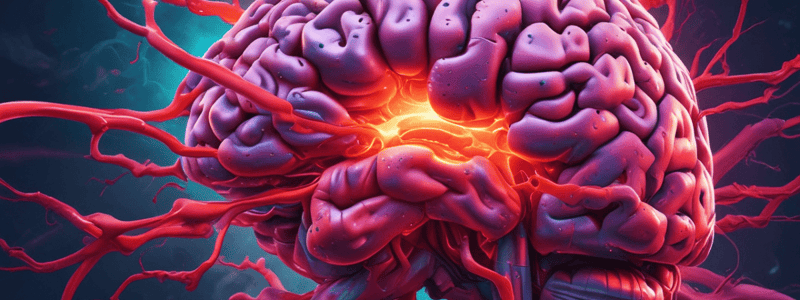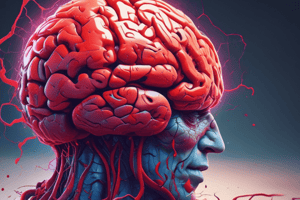Podcast
Questions and Answers
What is the main cause of a stroke?
What is the main cause of a stroke?
- A temporary surge in brain activity
- A sudden increase in brain cell production
- An excess of oxygen in the brain
- A lack of blood flow to the brain (correct)
What is the acronym used to identify the signs of a stroke?
What is the acronym used to identify the signs of a stroke?
- H.E.L.P.
- S.T.R.O.K.E.
- F.A.S.T. (correct)
- B.R.A.I.N.
What is the potential consequence of a stroke if not treated quickly?
What is the potential consequence of a stroke if not treated quickly?
- Temporary memory loss
- Temporary paralysis
- Increased brain activity
- Permanent brain damage (correct)
Which of the following is NOT a sign of a stroke according to the F.A.S.T. acronym?
Which of the following is NOT a sign of a stroke according to the F.A.S.T. acronym?
What should be done immediately if someone is showing signs of a stroke?
What should be done immediately if someone is showing signs of a stroke?
What is the key factor that determines the severity of a stroke?
What is the key factor that determines the severity of a stroke?
Asthma is a disease that causes breathing problems due to swollen and narrowed airways filled with mucus.
Asthma is a disease that causes breathing problems due to swollen and narrowed airways filled with mucus.
Asthma is always severe and requires daily medication.
Asthma is always severe and requires daily medication.
The exact cause of asthma is known to experts.
The exact cause of asthma is known to experts.
Asthma flare-ups can be triggered by exercise, allergens, colds/flu, and weather conditions.
Asthma flare-ups can be triggered by exercise, allergens, colds/flu, and weather conditions.
Avoiding triggers is the only way to treat asthma.
Avoiding triggers is the only way to treat asthma.
Asthma is a condition that affects the heart and not the lungs.
Asthma is a condition that affects the heart and not the lungs.
Asthma is a chronic respiratory condition that can cause breathing difficulties and flare-ups.
Asthma is a chronic respiratory condition that can cause breathing difficulties and flare-ups.
Asthma flare-ups are always caused by exposure to allergens.
Asthma flare-ups are always caused by exposure to allergens.
People with asthma should avoid physical activity to prevent flare-ups.
People with asthma should avoid physical activity to prevent flare-ups.
Asthma flare-ups can be life-threatening if not properly managed.
Asthma flare-ups can be life-threatening if not properly managed.
Asthma is a condition that only affects children.
Asthma is a condition that only affects children.
Epilepsy is one of the most common diseases of the ______ system.
Epilepsy is one of the most common diseases of the ______ system.
Epilepsy is a disease that causes ______ because of unusual electrical activity in the brain.
Epilepsy is a disease that causes ______ because of unusual electrical activity in the brain.
Someone with epilepsy may have a seizure that causes them to ______, pass out, fall down, stiffen up or stare into space.
Someone with epilepsy may have a seizure that causes them to ______, pass out, fall down, stiffen up or stare into space.
Most seizures last between 30 seconds to ______ minutes.
Most seizures last between 30 seconds to ______ minutes.
Some people with epilepsy may experience seizures when they play too many ______ games.
Some people with epilepsy may experience seizures when they play too many ______ games.
Some people with epilepsy may experience seizures when they don't get enough ______.
Some people with epilepsy may experience seizures when they don't get enough ______.
Match the following parts of the body with their functions:
Match the following parts of the body with their functions:
Match the following actions with their impact on preventing microbes:
Match the following actions with their impact on preventing microbes:
Match the following statements with their correct information about getting sick:
Match the following statements with their correct information about getting sick:
Match the following healthy habits with their benefits for the immune system:
Match the following healthy habits with their benefits for the immune system:
Match the following diseases with their effect on the body:
Match the following diseases with their effect on the body:
Match the following types of microbes with their descriptions:
Match the following types of microbes with their descriptions:
Match the following parts of the body with their roles in the immune system:
Match the following parts of the body with their roles in the immune system:
Match the following immune system terminologies with their functions:
Match the following immune system terminologies with their functions:
Match the following actions with their impact on preventing infections:
Match the following actions with their impact on preventing infections:
Match the following statements about the immune system with their accuracy:
Match the following statements about the immune system with their accuracy:
Match the following immune system concepts with their importance in fighting infections:
Match the following immune system concepts with their importance in fighting infections:
What is the primary function of the integumentary system?
What is the primary function of the integumentary system?
How does the skin regulate the body's temperature?
How does the skin regulate the body's temperature?
Explain the role of sensory receptors in the integumentary system.
Explain the role of sensory receptors in the integumentary system.
Why is the skin on the soles of the feet thicker than the skin on the eyelids?
Why is the skin on the soles of the feet thicker than the skin on the eyelids?
How does the integumentary system help prevent infection?
How does the integumentary system help prevent infection?
What is the average thickness of the skin around the body?
What is the average thickness of the skin around the body?
The hormonal system is also called the _________________________ system.
The hormonal system is also called the _________________________ system.
Hormones are chemical messages sent by our bodies that carry information and instructions from one set of cells to ________________________.
Hormones are chemical messages sent by our bodies that carry information and instructions from one set of cells to ________________________.
The _________________________ gland is a small pea sized gland that is referred to as the 'master gland'.
The _________________________ gland is a small pea sized gland that is referred to as the 'master gland'.
Thyroid hormones control the rate at which cells burn fuels from food to make ________________________.
Thyroid hormones control the rate at which cells burn fuels from food to make ________________________.
Epilepsy is a disease that causes ________________________ because of unusual electrical activity in the brain.
Epilepsy is a disease that causes ________________________ because of unusual electrical activity in the brain.
Asthma is a chronic respiratory condition that can cause breathing difficulties and ________________________.
Asthma is a chronic respiratory condition that can cause breathing difficulties and ________________________.
What is the function of the bladder in the excretory system?
What is the function of the bladder in the excretory system?
How many kidneys do we have, and where are they located?
How many kidneys do we have, and where are they located?
Which organ of the excretory system is responsible for carrying urine from the kidneys to the bladder?
Which organ of the excretory system is responsible for carrying urine from the kidneys to the bladder?
What is the primary job of the kidneys in the excretory system?
What is the primary job of the kidneys in the excretory system?
Which organ in the excretory system carries urine out of the body?
Which organ in the excretory system carries urine out of the body?
What is the purpose of the ureters in the urinary system?
What is the purpose of the ureters in the urinary system?
Flashcards are hidden until you start studying




